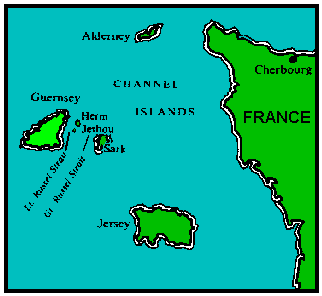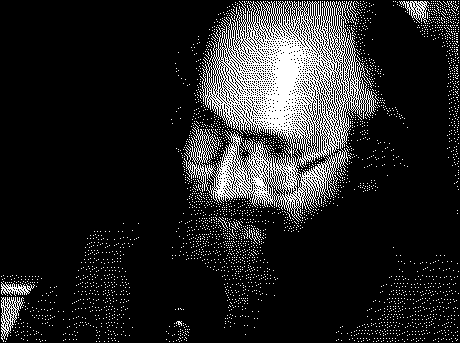![]()
I don't mind telling you about me if it will reinforce what I have said elsewhere.
I was born in 1961 and brought-up on the small island of Guernsey, about 120km south of England, but within sight of France. Guernsey has a long and complex history. At least, it does compared to Australia where I now live. I am glad to say that the unappreciated and forgotten Guernsey culture made its mark on me before tourism and tax evasion overran the island completely.

Click anywhere on the map for a detailed map of GuernseyThe sizeable Solway family lived in the North of the island, and my parents, my younger brother and I settled for a few years in a place called L'Islet ("The Island"). But it was no longer an island. Apparently, hundreds of years ago the North-East tip was separated from the mainland of Guernsey by a stretch of water which went from Grande Harve in the West through to St Sampsons "Bridge" (as it once was). The remnants of this division can still be seen today in the existing Vale Pond and the low-lying "Saltpans" district. To me, the island seemed alive and we people were but small and temporary outgrowths.
For an interesting study of traditional Guernsey culture and values I highly recommend The Book of Ebenezer Le Page by G.B. Edwards (Published by Penguin Books 1982).
I had a girlfriend at the age of ten, and within twelve months I felt that I had exhausted the possibilites of relationships with women.
When I was eleven years of age my father, who was now divorced, married an Australian nurse who was working on the island at the time and we all moved to Australia. Upon arriving in Sydney we immediately flew to Inverell, inland New South Wales, to stay at my new grandparents' country homestead. My first real touch of Australia was The Bush. I spent long days tracking the large red ants and being amazed at the variety of strange insects and animals. It was at this time, within a few days of arriving in Australia, that I decided the purpose of my life. I was in love with Nature, and could have no other lover.
Soon thereafter I determined to become a forester. It was also around this time that I came to the strong determination that I would never be like my parents. I was convinced that my parents were totally insane. I would spend long periods each day thinking about how unbelievably foolish they were. As I grew older it came as a great disappointment to me to discover that my parents were in fact absolutely normal. It became startlingly clear to me that if I wanted to be unlike my parents then I would have to be unlike everyone in the world. I didn't think this an impossible task because I knew I was already part of the way there - I had never met anyone who had realized what I had realized.
The move to suburban Brisbane was a real culture shock, and I still haven't quite recovered from it. It was like living in a doll's house, with everything plastic, and small people.
During my high-school years I studied chemistry, physics, biology, maths I, maths II, and english. I was best at biology and worst at chemistry. I was the top student in my biology class, but had a falling out with the teacher when I insisted that everything that happened must be natural, as Nature must have caused it. He would always treat me with respect, but never the same again.
I took a lot of time off school in my final years to play golf.
During these years I received two more younger brothers, Glen and Trent. I was just old enough to be their father and through the time I spent with them I felt that I exhausted the possibilities of parenthood.
I started to read science fiction; short stories especially - I never did like padding. Science fiction helped to give me a connection with the past, the future, and the rest of the Universe. Another reason I liked science fiction was that if there were any women in the story at all they were only in the background, so they weren't a distraction.
I never had a girlfriend during all this time. I was certainly attracted to some of the girls, but never enough to do very much. One of my dreams by now was to build an ecology on the moon and make it a comfortable place to live. Girls seemed to pale into insignificance alongside such thoughts.
At seventeen I studied first-year Science at The University of Queensland and then spent a further three years at The Department of Forestry at the Australian National University in Canberra to earn my BSc (Forestry). I enjoyed any subject involving biology and ecology - I would follow the thoughts out, and further out, to magnificent places beyond time.
A very special thing about forestry is that it involves thinking within a large time-frame. The forester sows the seeds for fruits he will not see in his lifetime.
There were only a handful of girls studying forestry in my year, which created a very pleasant atmosphere. None of these girls appeared to be especially intelligent, and only one of them was pretty. But again, despite one or two close encounters, none were quite pretty enough to draw me out of my contemplation.
Each summer vacation I would work as a gang member for the Forests Department of Western Australia in and around the town of Margaret River (the place of the big waves). Evenings and weekends in the "single men's huts" were very quiet indeed as I was nearly always the only one there, and it was a four kilometre walk into town. But the countryside was magnificent.
When I finished my degree I worked as the assistant manager of a private forestry company. I would get into trouble for not hearing my car radio when I went "walkabout". I would go "walkabout" as often as I could.
After six months or so I didn't appear to be making much impact on the protection of the global environment. I could save a patch of trees here or there, but if individual people don't care for their environment then any conservation efforts are a complete waste of time. I couldn't learn much more from the job, so I left.
I had to keep growing, and it was time to go "rough". I invested in a four-wheel drive and went fox hunting for skins with an ex-New Zealand deer hunter who was working as a tree-feller for my company at the time. We headed north into the flat and dry station country with our camping gear, baits and rifles. The spirit of the country was awesome. Occassionally on my wanderings I would find an old aboriginal cave in an isolated rocky outcrop, looking out over the plains. I would be transported back thousands of years. Other times I would find old mining camps, abandoned probably forty or fifty years ago, but looking as if the inhabitants would return any minute, with pots and pans and utensils resting alongside the stone fireplaces.
After one season of foxes I sold Encyclopaedia Britannica in Perth for a few months. I learned a lot about how low people will go to make money, and about how gullible people are. By now I was about twenty-two, and I judged that I had seen most of what people call "life" - and it wasn't for me. So I resolved to get really serious about enlightenment. I wanted to do something really worthwhile with my life - something very few people had ever done before. At first I spent a lot of money on all kinds of books about philosophy, psychology, and even astrology and palmistry. I particularly remember Paul Brunton's "The Hidden Teaching Beyond Yoga" and "The Wisdom of the Overself", though I do not think much of them now. His writings on "mentalism" were inspirational but he failed badly on deeper subjects.
After six months of reading and thinking I resolved to make a memorable symbolic gesture to speed my progress. I sold virtually everything I owned, for next to nothing, and headed back to Queensland.
Shortly after arriving in Brisbane I met David Quinn for the first time. He was to become one of the wisest men in Australia.
For the next eight or so years I lived in Brisbane, studying deeply Kierkegaard's Journals and Papers, Nietzsche's Thus Spake Zarathustra, Talks by Hakuin - Introductory to Lectures On the Records of Old Sokko (some are available as part of my Evil Wisdom compilation), The Gospel of Ramakrishna, the teachings of Ramana Maharshi, The Gospel of Thomas, The Tao Te Ching, The Stories of Chuang Tzu, The Dhammapada, The Bhagavad Gita, The Large Sutra on the Perfection of Wisdom, and Chandrakirti's Lucid Exposition of the Middle Way. During these years I wrote Poison for the Heart, in large part from notes written in my early twenties.
For pocket- money I wrote the shareware word processor Breeze. I also wrote an electronic book creator called Bigtext for my own use, and it also found a market as shareware.
I settled on a purpose for my life: the survival of wisdom. I always wanted to do something BIG, and this was the biggest anyone could ever do. It meant that not only would I have to become as wise as possible, but I would have to drag other people with me, who are my larger self. The problem was, I had only met one or two people in my whole life who had any genuine interest in truth and wisdom. So my first task was, and still is, to get people to a level where they at least have some respect for reason and truth.
Increasingly I realized the inseparability of reason and masculinity. At the same time I could not help noticing the increasing feminization of society. The only course open to me was to attack femininity at the root. My life's work, I decided, would focus on making people aware of the shortcomings of femininity and the great benefits of masculinity. For there to be wise men, there must first be men.
For the last few years I have been living in a small town called Maleny, in the hills about 120km North of Brisbane. I recently discovered a magnificent book, Sex & Character by Otto Weininger. I could only find one single copy of this book in the state of Queensland. Weininger describes the differences between the sexes better than anyone I know of, and understanding this difference is the first step towards all higher life. Weininger took his own life while still in his early twenties, but his thoughts are such that he will never disappear.
And for the future? I must continue. If you have some money to spare and would like to contribute to something of ultimate value, then please contact me. Any money will help. I would like to start a publishing company and television series.

 Back
to The Thinking Man's Minefield main page
Back
to The Thinking Man's Minefield main page